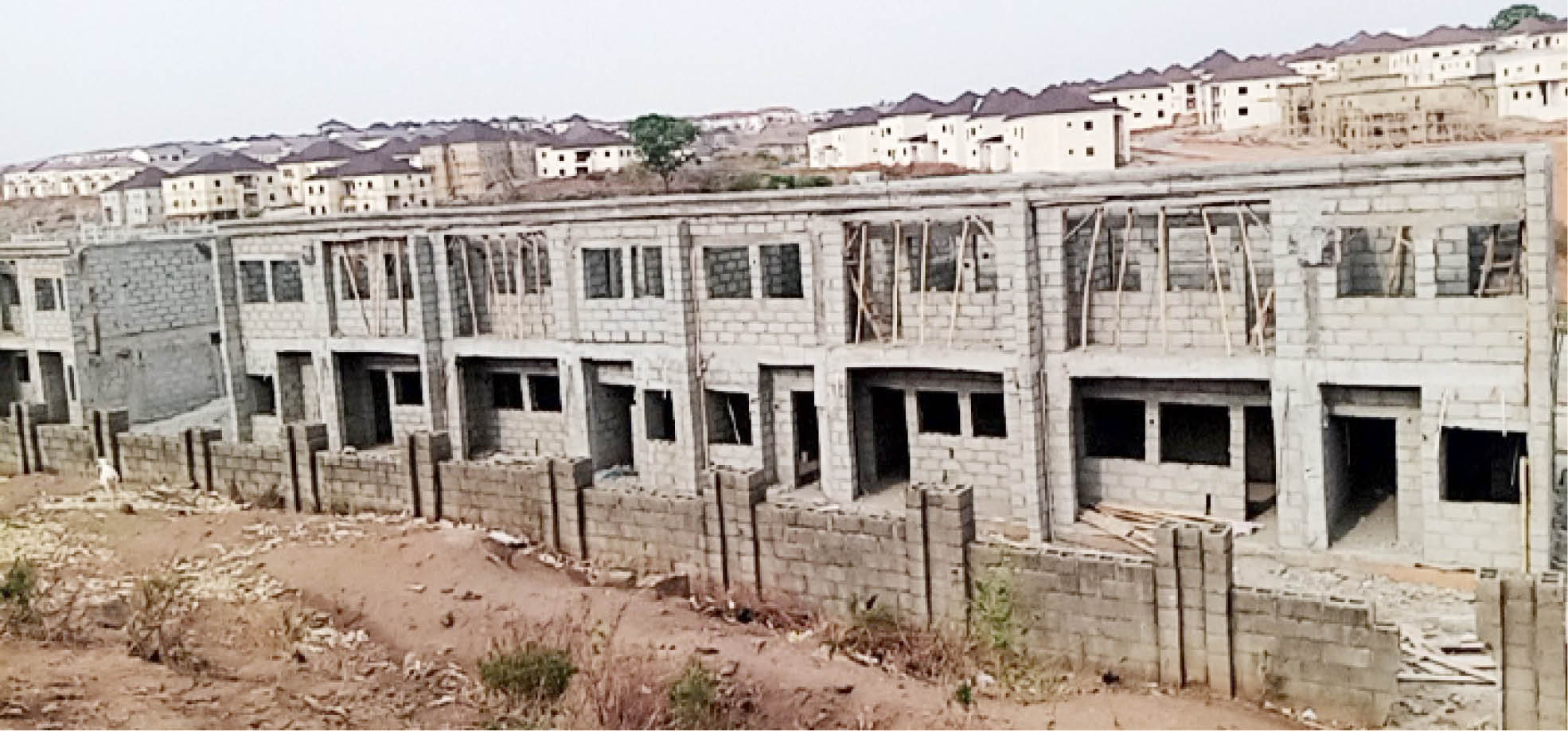Amidst 27m housing deficit, many estates unoccupied in Abuja
Abuja, Nigeria’s capital is one the growing cities in the world with beautiful and magnificent buildings across district, as well as hundreds of estates in the city centre. Daily Trust observes that most of these estates, built in many districts of the city centre, have fully fitted facilities such as motorable roads, water, electricity and […]

File photo of an estate under construction in Abuja
Abuja, Nigeria’s capital is one the growing cities in the world with beautiful and magnificent buildings across district, as well as hundreds of estates in the city centre.
Daily Trust observes that most of these estates, built in many districts of the city centre, have fully fitted facilities such as motorable roads, water, electricity and utility services.
However, the only missing elements in these beautifully constructed estates are usually human beings who are supposed to occupy them and bring them to life.
What is obtainable is that these properties sit in highbrow areas and surroundings unoccupied and unattended to and; in most cases, left to rot away.
- Oyo Lawmaker empowers 600 artisans, launches interest-free cooperative scheme
- US Election: Armed suspect arrested near Trump rally amid rising threats
The irony is that while these buildings are left unoccupied, many residents of Abuja are homeless, with some resorting to sleeping under bridges while others even sleep in their cars
Nigeria already is battling a 27 million housing deficit with an annual funding of N5 trillion required to solve the situation
Amidst the growing demand for housing infrastructure across the country, hundreds of completed buildings have remained at varied construction stages for long periods of time.
In Abuja today, names such as Asokoro, Maitama, Guzape, Jabi, Wuse 2 and Gwarimpa are places associated with the wealthy as they habour arrays of mansions that are very well-built, tastefully furnished, behind high electrified fences and guarded by stern looking security guards.
Due to the expensive nature of these places, one can only find the high and mighty in society living there. It is said that individuals who reside and have properties in such highbrow areas, are usually politicians, diplomats, top ranking civil servants and successful businessmen and women.
Unfortunately, most properties in these highbrow areas are virtually empty either because their rent/prices are exorbitant or the owners cannot be reached.
Most of these properties are guarded by security operatives but remain inhabited.
The situation explains the rationale behind the assertion that over 80 per cent of Abuja residents reside mainly in the satellite towns and remote communities where they can easily afford the rent.
Similarly, most of these highbrow areas are now bordered by slums. Checks by this newspaper shows that Jabi, Asokoro, Maitama, Guzape, Gwarimpa, among others, now have slums and villages springing up around them.
Even at that, there is a growing demand for decent, affordable accommodation for the different classes of Nigerians living in the federal capital territory.
Only recently, the federal government, through the Ministry of Housing and Urban Development said it has concluded plans to compel owners of houses that have remained unoccupied for long periods of time to rent them out or risk paying heavy ground rents.
The Minister for Housing and Urban Development, Architect Ahmed Musa Dangiwa, expressed concern over the huge number of unoccupied but completed estates across the country.
“There are lots of abandoned estates, especially in Abuja and the vicinity. I think, in some other states, we do have a few of them. We want to take stock of all those abandoned houses. Then, we will interface with the owners of the houses, to find out what they want. Do you want to keep these houses? If you want to keep them unoccupied, the government will charge you triple ground rent instead of the single ground rent that we charge.
“That will force them to put the buildings on rent for whatever amount or sell them off because we can’t keep saying that we have a housing deficit when we have a lot of empty houses that have been completed but left unoccupied.
“So, we have told the Department of Lands, Urban and Regional Planning in our ministry to take stock of those estates and give us the names of the proprietors so that the owners of those estates will be informed of our plans. Any estate that stays more than three months unoccupied we’ll start charging the developer or owner triple ground rent. That’s what we intend to do.
“We understand clearly that the housing deficit is not solely about the quantity of structures, but also about the quality of living conditions. So, we want to know whether the homes that Nigerians live in provide access to good sanitation, proper toilets, sufficient living spaces, a healthy environment, and other essential amenities.
“We have written to Mr President and we are hopeful that with his approval for the conduct of the census, we should fix this problem and put an end to this national embarrassment.
Why some buildings remain unoccupied
Speaking to Daily Trust, a realtor, Anthonia David, said amidst the high demand for residential housing, billions of naira have been and continue to be poured into building houses that nobody will occupy because of the high rents and amounts demanded for outright sale.
“You know that about 90 per cent of building materials are imported and when developers spend millions or billions to finish their properties, they have to sell them at the right price to recoup if not they won’t sell so the problem will continue except there are some sort of subsidies for the real estate sector, that way the impact will be less on tenants,” she said.
